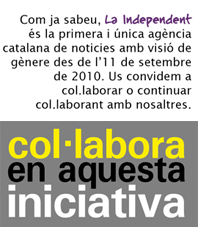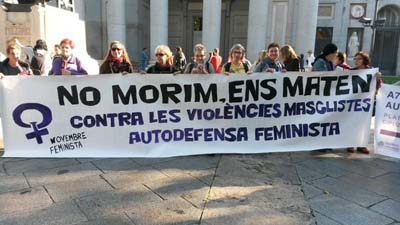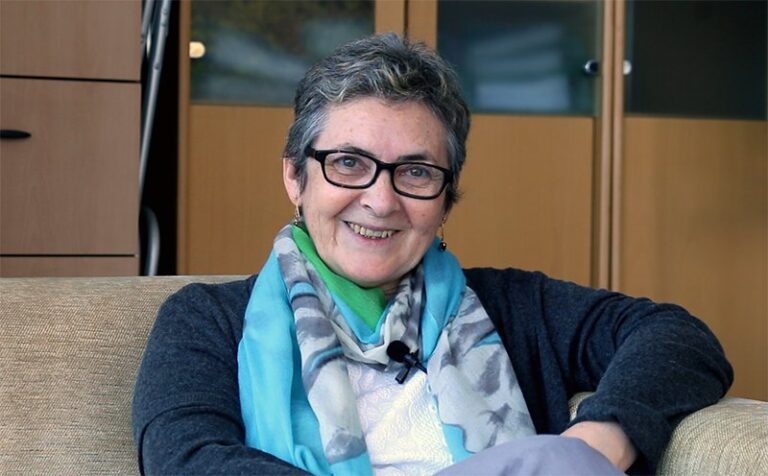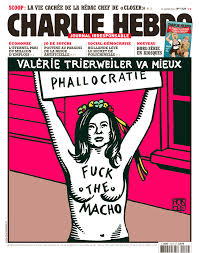
For the freedom of speech, political and religious satire and against the tyranny of silence, ‘Nous sommes toutes Charlie“.
The execution of cartoonists and journalists of the French weekly Charlie Hebdo has impacted almost every corner of the planet, but the killings and imprisonment of journalists has become a sad practice in all regions of the world.
118 people (135, whether the 17 accidental victims at work are added), more men than women, have been killed in 2014 during the course of their work, attacked directly or in crossfire.

At December 31, those were the figures published by the International Federation of Journalists (FIP). But 2015 has started very badly. The bad data consists of 11 people shot down. Khalid Mohammed al Washali correspondent of Channel Al-Masirah, opened the list on 4 January (along with three other civilians) in the city of Dhamar, south of the Yemeni capital, Sanaa, because of the explosion of a bomb, claimed by the group of Al-Qaeda in the Arabian Peninsula (AQAP by the acronym in English). The following victims were the colleagues and Charli Hebdo in Paris.
Journalists killed generally in war zones
These 118 victims also represent an increase of 13 professionals regarding 105 the previous year. Topping the list appears the Asia Pacific, the most dangerous region in the world for journalistic work, with 35 victims; followed closely Middle East, with 31 deaths and the next danger zone is Latin America, with 26 murders.
Africa has a record of 17 victims, particularly in war zones (Somalia, Central African Republic, Democratic Republic of Congo and Guinea Conakry). In the latter country, according to the International Press Institute (IPI) two journalists were “killed by settlers while accompanying a medical team, which distributed information about the Ebola virus”. In Europe 9 journalists died. The Freedom House IPI believes that “press freedom is at its lowest level” and notes “strong pressure” to silence the media in Ukraine, Russia, Turkey and Azerbaijan.
Pakistan the most dangerous for the job
According to data from the FIP, the largest number of kidnap victims, executed or murdered in 2014, stood in Asia and the Middle East, where wars or attacks by armed groups persist. Pakistan, with the Taliban offensive against education and freedom of expression, is the most dangerous country for journalism with 14 fatalities. It is followed by Syria (12, including two American photojournalists beheaded), Afghanistan (9), Palestine (9) and Iraq (8).
In Ukraine have been killed eight journalists. The IFJ says that in Ukraine and the Gaza Strip have been made “reckless attacks” or premeditated against media.
In Latin American five men reporters were killed in Honduras, another 5 in Mexico, 4 in Paraguay (1 woman), 3 in Colombia (1 woman), 3 men in Brazil, 2 in Peru and another 2 in Dominican Republic. In the area of accidental or natural disasters died two men in Argentina, one in El Salvador and 1 woman in Brazil.
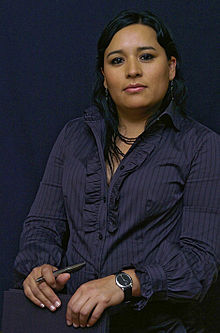
Ana Lilia Perez, exiliada de Mèxic per amenaces de mort
Criminal permissiveness in Honduras and Mexico
According to IFJ, the journalists who dare to report on drug trafficking and corruption schemes are the victims, mainly in Honduras and Mexico, where acts organized crime and drug trafficking, with the almost total permissiveness authorities. At least, this is one of the conclusions of the mission to the International Federation of Journalists conducted in September 2014 in the Mexican state of Guerrero (where were murdered 43 students in Iguala). There the IFJ pressed Mexican authorities (local, federal and national) to exercise their “duty to protect” people who work in the media because “information and freedom of the press is one of the human rights” and also “the information is necessary for development and social justice”.
The Brazilian Beth Costa, IFJ General Secretary since 2011, said that “levels of violence against journalists is still unacceptably high in countries where this profession involves great risks to their daily lives” and added that “unfortunately many people have paid a high price this year (2014) with the loss of his life, in the spiral of violence that surrounds the media and that increases with the climate of impunity”.
So Beth Costa (enllaç video) notes that the FIP has become “permanent campaign against impunity, and urges governments and Justice of all countries to investigate all crimes against journalists and punish their murderers” because “every time a journalist is killed is silenced the voice of society”. The general secretary also encourages Union members of the Federation to join the campaign against impunity.
The worst year in incarceration
That 2014 is the worst year for the number of imprisoned journalists is an affirmation of Swedish journalist Martin Karl Schibbye, imprisoned with photographer Johan Persson in Ethiopia in 2011, because of supposed “links to terrorism” to enter illegally in the Ethiopian region of Ogaden, the National Liberation Front’s area. Both were acquitted and released a year later.
Three male journalists from Al Jazeera in English are also over a year in prison in Egypt, for alleged “membership of a terrorist organization” (in this case the Muslim Brotherhood) and for “spreading false news”. Sentenced in 2014 between 7 and 10 years in prison, they may appear again before a Court and have another trial, by order of the Egyptian Court of Cassation due to international pressure.
Egyptian women journalists were not arrested, but they were attacked and raped in Tahrir Square since the beginning of the Arab Spring in 2011 but, also in 2013, during protests against the military coup of Aldelfatah Al-Sisi against the elected President Mohamed Mursi. It is a deterrent brutal tactics to stop them information on the street.
Reporters without Borders (RSF), which amounts to 177 the journalists jailed worldwide is demanding the release of a total of 16 journalists in prison in Egypt. The country today “is the fourth largest prison in the world for people who practice journalism, after China, Eritrea and Iran”.
To William Horsley, a former BBC journalist and International Director of CFOM (Centre for Freedom of the Media (CFOM), 220 journalists are behind bars worldwide. The Chinese has too the painful RSF leadership, but the CFOM says a third of the jailed journalists are in prison in Syria, Egypt, Russia and Myanmar (formerly Burma). In Iran there are 30 people imprisoned, 23 others Eritrea, all of them without charge, according to “the protection of media Freedom in Europe” report CFOM.
In this case, the bars and murders match the same countries: Syria, Palestine, Ukraine, Iraq and Libya. The CFOM says further that “it is exercising police violence against journalists at the two ends countries of Europe: Russia and Spain”.

La periodista i presentadora de la TV turca, Sedef Kabas
Turkey, the worst ranking against the liberties
Turkey has the worst ranking of imprisoned since 2012, although their number is not encrypted. RSF says that “about 70 media workers face several lawsuits for publishing information about alleged corruption of the government of then Prime Minister Recep Yayyip Erdogan, now president, despite the closure of the Parliamentary Commission that investigated” that cases.
Precisely for criticizing on Twitter this investigation in October 2014, Sedef Kabas, a well known journalist and Turkish television is on the list of defendants. The Turkish authorities entered his home and confiscated her cell phone and her computer. She was released by court order, despite the request of the prosecution to keep custody. Sedef Kabas has received threats from various members of the AKP (Justice and Development Party), in power since 2003.
Also for a comment on Twitter one of the president’s Erdogan advisers was arrested on December 30 the journalist of the newspaper Taraf, Mehmet Baransu, as recorded by RSF.
But Turkey has also been disqualified in terms of freedom of information for obstructing and sometimes disconnecting internet access when the information does not agree to the above prime minister and now president. Erdogan also became notorious in late November for criticizing feminists for its demand the right to decide freely about motherhood, for rating of “murder” abortion and for defend the exclusive role of ‘mother’ by women, which urged to have at least three babies.
The International PEN (Poets Essayists and Writers), which accounts for cases prosecuted or imprisoned writers and journalists, indicates that in 2014 the number had risen to 900 people, from 201 cases recorded in 2000.
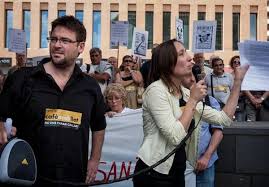
Marta Sibina de Cafèambllet, abans d’entrar als jutjats
Cafèambllet as an example of institutional pressure
Marta Sibina, co-editor of the Catalan magazine cafèambllet.com has participated in 28th of November in Madrid, at a seminar on freedom of speech and information of the International Press Institute (IPI) in which the Spanish laws on defamation were analyzed. She and the other co-editor of CafèAMBllet, Albano Dante, were brought to justice for having covered in their web magazine some corruption in the Catalan Health in 2012 in a video titled “el major robatori de la historia de Catalunya”
The trial, with wide media coverage was held on September 27, 2012 and attended by hundreds of people before the courts, in support of the magazine. After a year of a long legal odyssey, CafèAMBllet was acquitted of all charges.

